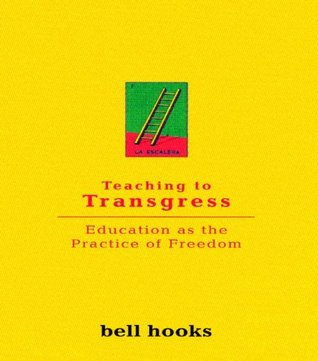More on this book
Community
Kindle Notes & Highlights
by
bell hooks
Read between
January 24 - March 11, 2021
In many classes this comes full circle. In the end it’s the teacher’s voice that everyone knew all along was the only one to listen to. And now that we’ve gone around in a circle—an exaggerated thing—we all know that the democratic voice, an expression of that voice, leads to a rather conservative conclusion. Even though students are speaking they don’t really know how to listen to other students.
So one of the responsibilities of the teacher is to help create an environment where students learn that, in addition to speaking, it is important to listen respectfully to others.
Curious about how to apply this to math. St first i discounted it and then i began to ask myself how could active listening and critique work to share voice and help each other grow in problem solving?
I see it as a fundamental responsibility of the teacher to show by example the ability to listen to others seriously.
One of the reasons I appreciate people linking the personal to the academic is that I think that the more students recognize their own uniqueness and particularity, the more they listen.
So, one of my teaching strategies is to redirect their attention away from my voice to one another’s voices.
I often find that this happens most quickly when students share experiences in conjunction with academic subject matter, beca...
This highlight has been truncated due to consecutive passage length restrictions.
At times I need to interrupt students and say, “That’s interesting, but how does that relate to the novel we’re reading?”
Many people, both students and professors, believe that when they hear people like ourselves talking about encouraging a student’s opinion in class we’re merely endorsing the stereotypical rap session: everyone says anything they want; there’s no real direction or purpose to the class other than making each other feel good; that anything can be said. Yet one can be critical and be respectful at the same time. One can interrupt someone, and still have a serious, respectful dialogue. All too often it is assumed that if you “give students the freedom”—and it’s a mistake to think we’re talking
...more
The bottom-line assumption has to be that everyone in the classroom is able to act responsibly. That has to be the starting point—that we are able to act responsibly together to create a learning environment. All too often we have been trained as professors to assume students are not capable of acting responsibly, that if we don’t exert control over them, then there’s just going to be mayhem. RS: Or excess. There is such a fear of letting go in the classroom, of taking risks. When professors let go it is not only the student voice that must speak freely but also the professor’s voice. Teachers
...more
Yet the classroom should be a space where we’re all in power in different ways. That means we professors should be empowered by our interactions with students.
Along with them I grow intellectually, developing sharper understandings of how to share knowledge and what to do in my participatory role with students.
This is one of the primary differences between education as a practice of freedom and the conservative banking system which encourages professors to believe deep down in the core of their being that they have nothing to learn from their students.
The power of the liberatory classroom is in fact the power of the learning process, the work we do to establish a community.
Another difficulty I had to work through early on as a professor was evaluating whether or not our experience in the classroom had been rewarding. In the classes I teach, students are often presented with new paradigms and are being asked to shift their ways of thinking to consider new perspectives. In the past I have often felt that this type of learning process is very hard; it’s painful and troubling. It may be six months or a year, even two years later, that they realize the importance of what they have learned. That was really hard for me, because I think part of what the banking system
...more
We have to learn how to appreciate difficulty, too, as a stage in intellectual development. Or accept that that cozy, good feeling may at times block the possibility of giving students space to feel that there is integrity to be found in grappling with difficult material, whether that material comes from confessional narratives, books, or discussions.
Sometimes it’s important to remind students that joy can be present along with hard work. Not every moment in the classroom will necessarily be one that brings you immediate pleasure, but that doesn’t preclude the possibility of joy. Nor does it deny the reality that learning can be painful. And sometimes it’s necessary to remind students and colleagues that pain and painful situations don’t necessarily translate into harm. We make that very fundamental mistake all the time. Not all pain is harm, and not all pleasure is good.


